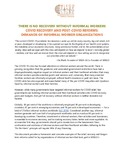There is no Recovery Without Informal Workers Covid Recovery and Post-Covid Reforms: Demands of Informal Worker Organizations
Abstract
The COVID-19 crisis has focused attention on informal workers around the world. There is
growing recognition that the pandemic and associated government restrictions have had a
disproportionately negative impact on informal workers and their livelihood activities; that many
informal workers provide essential goods and services; and, conversely, that many essential
frontline workers are informally employed, without health insurance or paid sick leave. The
COVID crisis has also exposed and exacerbated many of the pre-COVID inequities and injustices
faced by informal workers and their families.
However, while many governments have targeted informal workers for COVID relief, few
governments are building informal workers and their livelihood activities into COVID recovery
plans and budgets. And yet full recovery without informal workers is neither desirable nor
feasible.
Globally, 60 per cent of the workforce is informally employed; 90 per cent in developing
countries, 67 per cent in emerging economies, and 18 per cent in developed economies — for a
total of 2 billion informal workers worldwide (ILO 2018). Considered another way, informal
workers generate well over half of employment worldwide; and as much as 90 per cent in
developing countries. Therefore, investment in informal workers, their activities and businesses,
is essential to economic recovery, and to making recovery faster, better and more equitable. As
an essential first step, governments should put a moratorium on the harassment, fines,
confiscation and evictions of informal workers and their livelihood activities. Adhering to this
“Do No Harm” principle will require little (if any) financing.

